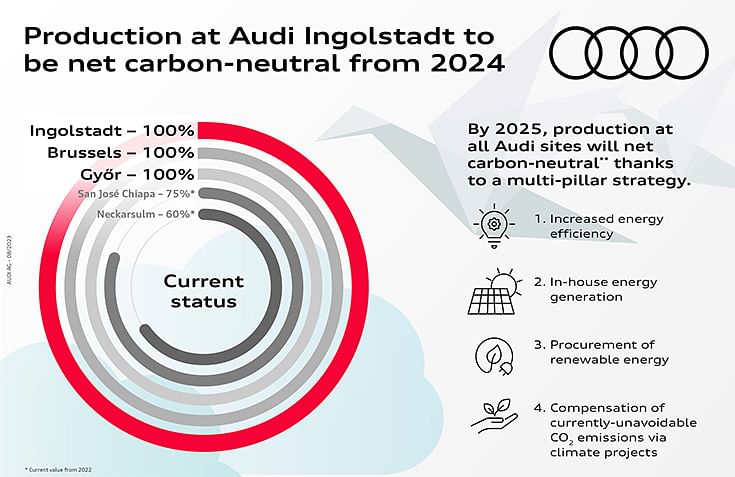Audi Ingolstadt to begin net carbon-neutral production in January 2024
Production of the upcoming fully electric Audi Q6 e-tron series, as well as all other vehicles built at the site, will be net carbon-neutral starting in 2024; all Audi sites will be net carbon-neutral by 2025
The Audi plant in Ingolstadt will begin net carbon-neutral production on January 1, 2024. The main plant will commence building the new Audi Q6 e-tron series next year. After Brussels (Belgium, 2018) and Győr (Hungary, 2020), it will be the third Audi plant to operate with net zero emissions.
In addition are the Audi R8 and e-tron GT quattro1 models, which have been built at Böllinger Hofe with net zero emissions since 2020. As part of its Mission:Zero environmental program, Audi has set itself the goal of achieving net carbon neutrality at all its sites worldwide by 2025. By then, the final steps will have been taken in Neckarsulm and San José Chiapa (Mexico).
FOUR-PILLAR GREEN STRATEGY
Audi Board Member for Production and Logistics Gerd Walker emphasized: “Protecting the environment as best as possible is firmly anchored in Audi’s corporate strategy. By transitioning the Ingolstadt site to renewable energies, we are taking a major step toward our goal of net carbon-neutral vehicle production.” To achieve its ambitious goal, the brand with the four rings is implementing a four-pillar concept.
In the first pillar, Audi is improving energy efficiency at its sites, which will already avoid large amounts of carbon emissions. In 2022, for example, these energy management measures allowed the Ingolstadt site to save more than 35,000 megawatt hours of energy and prevent more than 5,000 tons of carbon emissions.
In addition, Audi also generates renewable energy in-house, the second pillar of the concept. To date, photovoltaic modules have been installed on an area of 23,000 square metres at the Ingolstadt plant. In the coming years, Audi will continue to increase the share of energy it generates itself at all its production sites. Various additional measures are currently being planned and implemented at the main plant.
 To achieve its carbon-neutrality goal, Audi is implementing a four-pillar concept..
To achieve its carbon-neutrality goal, Audi is implementing a four-pillar concept..
As the third pillar of the concept, Audi is also transitioning its energy procurement to be net carbon neutral. Audi has been producing cars in Ingolstadt exclusively with green electricity since early 2012. This early transition made the brand with the four rings a pioneer of sustainability in the industry at the time.
According to Dr. Rüdiger Recknagel, Head of Environmental Protection for the Audi Group, “A neighbouring refinery and the municipal waste recycling plant supply the main plant with net carbon-neutral waste heat. Additionally, we have secured large quantities of biogas to ensure a net carbon-neutral heat supply.”
In this way, the site covers almost all of its energy needs from renewable sources. As the fourth and final pillar, any emissions that Audi cannot yet avoid (a maximum of 10 percent of the original carbon emissions) are offset by purchasing carbon credits that are certified according to the highest quality standards such as Gold Standard. At the Ingolstadt plant, this also includes logistics within the plant.
MISSION ZERO: GOING BEYOND DECARBONISATION
The measures of the carmaker’s environmental program Mission:Zero go beyond decarbonization and address the key areas of activity of water use, resource efficiency, and the protection and preservation of biodiversity.
Audi’s vision is to create a circular economy where resources such as plastics, water, and other raw materials are used in closed cycles. In Ingolstadt, for example, the company has been operating a process water supply centre with a membrane bioreactor since 2019 to use water more efficiently. This year, Audi became the first premium car manufacturer to join the Alliance for Water Stewardship (AWS). Audi plans to halve the ecologically weighted water consumption at its production sites worldwide by 2035. The plant in San José Chiapa, Mexico, which has been building cars without producing any wastewater since 2018, stands as a role model for the responsible use of water resources.
Finally, as a member of the ‘Biodiversity in Good Company’ initiative, the brand with the four rings is also committed to protecting biodiversity at all its sites. The open spaces at the external site in Münchsmünster, which are designed to remain close to their natural form, are among the company’s largest measures in this area. On some 17 hectares of the site, a habitat has been created for numerous animal and plant species.
RELATED ARTICLES
Autoliv Plans JV for Advanced Safety Electronics With China’s HSAE
The new joint venture, which is to be located strategically near Shanghai and close to several existing Autoliv sites in...
JLR to Restart Production Over a Month After September Hacking
Manufacturing operations at the Tata Group-owned British luxury car and SUV manufacturer were shut down following a cybe...
BYD UK Sales Jump 880% in September to 11,271 units
Sales record sets the UK apart as the largest international market for BYD outside of China for the first time. The Seal...






 By Autocar Professional Bureau
By Autocar Professional Bureau
 28 Sep 2023
28 Sep 2023
 4097 Views
4097 Views










 Ajit Dalvi
Ajit Dalvi




